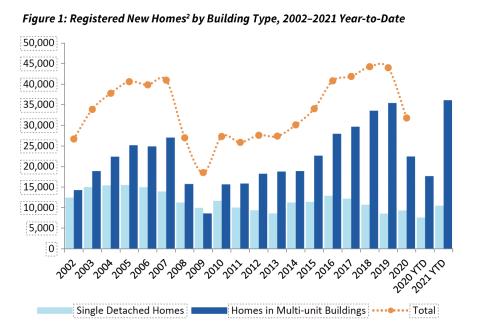David Eby, Attorney General and Minister Responsible for Housing, has responded to UBCM President Laurey-Anne Roodenburg’s request for clarification on comments regarding the withholding of funding from municipalities that do not work on housing supply.
As noted in President Roodenburg’s letter, UBCM has supported a collaborative approach to address the affordability crisis that is based upon a recognition of the work that local governments have undertaken to support provincial efforts to-date.
BC Housing’s October New Homes Registry Report indicates that 2021 is on track to be a record year, with a total of 46,608 new homes registered in the first ten months of this year (Figure 1). This follows on nine consecutive years (2011-2019) of increasing numbers of registered new homes. 2020, the first year of the pandemic, saw a sharp, but seemingly temporary decline. 2021 is also showing a dramatic increase in purpose-built rentals - the most important form of supply given the current state of the housing crisis – with over 11,678 units already registered, which represents close to a 60% increase over the entire output of 2020.

Within this context, the four policy shifts identified in UBCM’s housing strategy remain relevant today to ensure an evidence-based approach to housing that focuses on increased “right supply” along with measures manage demand:
- A Rental Housing Strategy to help address a deficit in rental housing built up through decades of policy priority on homeownership. In addition, an emphasis on “right supply” more generally including a variety of forms of attainable housing, not just supply for the sake of supply.
- A Demand Management Strategy with measures to stabilize prices and restore affordability. In the present context, further data development and measures are required to address wide ranging current pressures on housing affordability including Real Estate Investment Trust (REIT) purchasing, speculative investment, short term rentals and increasing insurance costs.
- A Comprehensive Homeless Strategy to substantially reduce the number of people who are homeless. While supportive housing continues to be critically needed, further investments in attainable housing and demand management are also needed to reduce pathways into homelessness.
- An All-Government Approach towards Housing Affordability, through which all orders of government collaborate at a community level to bring about community appropriate change.
UBCM will continue advocate for further action on these priorities and to encourage funding and policy approaches that respect local government autonomy.
